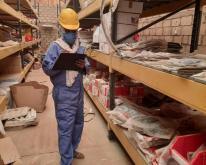At a point where the world strives to respond to the threat of COVID-19 and recover from its impact, calls for gender equality are at the core of efforts to building back better. In response to the crisis, there is an emphasis on having more women in leadership as a key to achieving an equal future. This article highlights how women UN Volunteer Peacekeepers in Sudan continue to challenge stereotypes while they combat the pandemic.
Ekram Fator is a Sudanese woman serving as a national UN Volunteer Warehouse Assistant with the UN-African Union Mission in Darfur (UNAMID). She works in the transport warehouse where she supports the overall management of stock. By choosing to serve in such a role, traditionally seen to be more fit for men, Ekram is breaking social barriers and challenging gender stereotypes.
“Without women in leadership, women’s empowerment cannot be pushed forward. Men can support by listening to women, advocating for their rights, and engaging with them,” said Ekram when asked about necessary steps to promoting gender equality and women empowerment.
"I want young women to know that being a leader is not related to gender, race, or religion. A woman can become a great leader. A person’s leadership ability should depend on their individual strengths and personality traits. However, in many cases, women aren’t encouraged to take on leadership roles as often as their male counterparts," states Ekram Fator, UN Volunteer Warehouse Assistant with UNAMID, Sudan.
Serving in a field with a predominantly male workforce, Makida Engdawork, from Ethiopia, is currently supporting the UN Interim Security Force for Abyei (UNISFA) as a UN Volunteer Engineering Operations Support Officer. She manages construction projects within the mission’s facilities, including pathways, drainage systems, road crossings, and installing steel culverts. Her role helps ensure that the mission’s civilian and military personnel have access to water and electricity, in addition to supporting the mission in providing humanitarian assistance and responding to emergency health needs.
Makida says she is familiar with traditions and customs that hold women back in some communities. Therefore, advocating for non-discriminatory policies towards women is key to having a future where more women can assume leadership roles. “More women leaders are needed, particularly in societies where the contributions of women are undervalued. Men can play their part by putting their trust in women and giving them opportunities,” she adds.
"Women have a power that lies in their souls. You need to focus on your goals and put in the work. The bigger the dream, the bigger the challenges. Women can do whatever men can do. Women like Angela Merkel, Jacinda Ardern and Oprah Winfrey are a testament to this. Believe in yourself, go forward, put your foot in this world and achieve your goal and say I won!" explains Makida Engdawork, UN Volunteer Engineering Operations Support Officer with UNISFA, Abyei.
For Anggerik Masthanm, from Malaysia, who serves as a UN Volunteer Nurse with UNISFA, the COVID-19 outbreak presented an unprecedented challenge, one which she chose to proactively rise to. Witnessing the heightened stress levels and the suffering of patients who had contracted the virus motivated Anggerik to learn more about caring for COVID-19 patients and those affected by it. She enrolled in a contact tracing course and subsequently became part of the Contact Tracing and Surveillance Committee within the Abyei mission. This experience made her realize that patients just needed to feel comforted and to have someone to talk to.
Misconceptions and gender stereotypes are also present in Anggerik’s own explanation of why women are underrepresented in leadership. Women are not viewed as having the qualities necessary to become leaders. Thus, “breaking gender stereotypes is critical to having more women in leadership,” she argues.
Like Ekram and Makida, Anggerik believes that men have a major role to play.
“Men can help by making sure women get the credit they deserve for their contributions. Men must also confront their biases and speak up for female colleagues who get interrupted when sharing their ideas. Moreover, men can guide and mentor women on how they can put their name forward for assignments and promotions." states Anggerik Masthan, a UN Volunteer with UNISFA, Abyei.
“Every small step you take brings you closer to your dreams. Practice resilience, be bold, and work proactively towards reaching your goals. Don’t wait to be seen. Present yourself and dare to be different. And remember: the sky is the limit!” concludes Anggerik.

